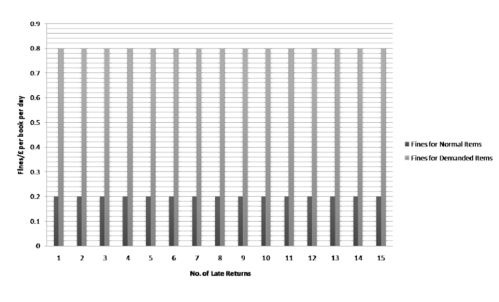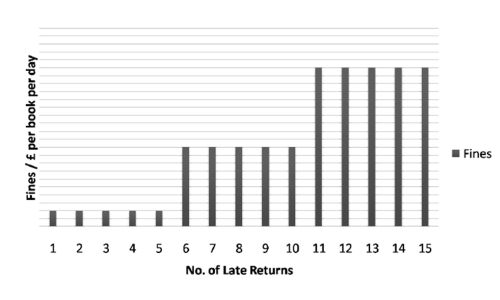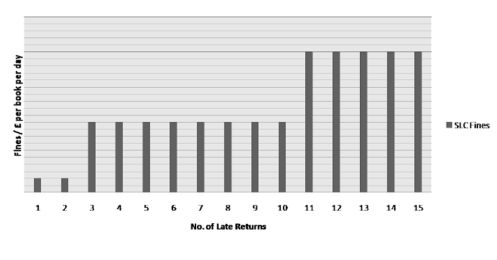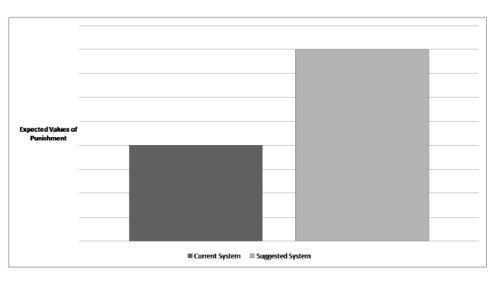Library Fines, Trust Games and Reciprocity
by Michael Yeung[1], Department of Economics, University of Warwick
Abstract
This paper investigates a trivial problem of library fines from different angles of economics, including utility theory and game theory. I have attempted to solve the puzzle of why students choose to pay avoidable fines by developing a theoretical model which shows that social capital, such as interpersonal trust, has a role to play in influencing the actual behaviour of library users. A survey was conducted at the University of Warwick to test this model empirically. Responses were collected from 1300 students. 59% claimed that they had fines, and a significant proportion of the students (40%) claimed that they were trusting. This paper finds that the contractual element of trust has an effect on the actual behaviour of library users. A poor, pre-ultimate-year male student, whose level of trust is high and level of insouciance is low, and did not have any fines from the Short Loan Collection, has the least library fines on average. This paper has expatiated some possible public policy implications. A new fines system, which fosters trust among library users, has been suggested at the end of this paper.
Keywords: Behavioural Economics, Trust, Reciprocity, Library Fines, Survey, Social Capital
Introduction
Every student has undoubtedly experienced the long hold times when waiting for popular books from the library. It is not uncommon for there to be a dozen coursemates vying for the same book. Sometimes, the size of the queue can be quite daunting. From my observations at the University of Warwick Library, I have noticed students intentionally choosing not to return books, especially before exams and essay deadlines, rather than failing to return it due to pure forgetfulness. Obviously those students are willing to pay for the fines and nothing can be done by the library. This happens frequently, in particular with highly demanded items or items with only one circulating copy. However, this practice breeds social unfreedom. Library books are scarce resources, so the late return of books will inevitably create a negative externality to the University population, by imposing a penalty of opportunity cost to everyone else in the readership base who is not holding the book. Despite the prevalence of the issue and its prognostic significance in daily-life, few attempts have been made to provide an economic justification.
To address this issue, some new socio-economical insights are needed, to supplement the conventional economic thinking of crime and punishment. Recent research suggested that "social capital", such as interpersonal trust, has positive effects on numerous significant socio-economical issues. The level of trust, as a socio-economical endowment, can strongly predict economic success (Arrow, 1972; Fukuyama, 1996); increase economic growth (Knack and Keefer, 1997); reduce government corruption (La Porta et al., 1997); enhance the efficiency of local governments (Putnam, 1993), and that of large organisations (Bromiley et al., 1995, Nooteboom and Six, 2003). This project aims to establish a relationship and provide justification of late return of library books, by creating a model, to show how interactions among students under asymmetric information shape the aggregate outcome of the accumulation of library fines. Berg et al. (1995)'s "trust game" insinuated that, when the exchange of library books is sequential and non-binding, the agent acting first is exposed to the possibility that even if he honours the agreement (i.e. returning the book on time), the other agent may choose not to. A survey of 1300 respondents was then run to empirically test the model. The results show that an increase of the level of trust by one standard deviation leads to a £2.54 decrement in accumulative library fines incurred by an average student over an academic year (statistically significant at 1%). This suggests that the contractual element of trust indeed has an effect on the actual behaviour of library users.
Literature Review
The economics of fines
Fines have been part of our lives for centuries – the origin of the word "fine" is from the Latin finalis concordia. It was used as a form of assurance. One of the earliest documented concepts in the literature is 1187 AD[2] (Cruise, 1794, p.4 and own calculations). Most libraries collect fines, and they can be treated very seriously: collection agencies are employed to recover library fines, and a reader's credit score may be impacted (Barnard and McGinty, 2007).
Warwick's local reality
At Warwick, the University Library introduced mechanisms to mitigate the problem related to the forgetfulness of library users in 2005/06 so that students would incur fewer fines, e.g. sending reminder emails to readers before the due-date, and putting bookmarks to remind readers to renew their books. Scholars in librarianship such as Ajay and Okunlola (2005), Burgin and Hansel (1984), Martin and Park (1998) predicted that, due to the increased convenience of book renewal, theoretically readers would incur fewer library fines. However, the revenue from library fines did not drop significantly, with the number of full-time students remaining constant and no increase in the level of fines. Therefore, there must be some true motives affecting the decision making, other than pure forgetfulness.
|
2005/2006 |
2006/2007 | 2007/2008 | |
| Fines income / £ | 110,148 | 109,896 | 103,473 |
| Full-time students enrolled | 16,175 | 15,969 | 16,646 |
Table 1: Revenue from library fines and number of full-time students at Warwick (trended). Source: Academic Office and University of Warwick Library via Freedom of Information Act (2000)
Utility theory
Why do people choose to pay fines instead of returning the book?
This thought implies that some economics about individual preferences can be used to parse the relative satisfaction from, or desirability of, keeping a book after the due date (i.e. committing a crime) versus the punishment received. Becker (1968)'s model is a benchmark model of crime and punishment. He treated criminals as rational and homo-economicus[3] utility maximisers. A rational person will commit a crime if his expected utility was greater than the utility gained of not committing a crime. He claimed that there exists an optimal combination of detection and level of punishment, leading to the "crime does not pay" situation, where risk-neutral offenders would not commit a crime. Using Becker's terminology, "failure to return" and "library fines" are analogous to "crime" and "punishment" respectively. The optimal levels of punishment and detection can therefore be determined to change the subjective views of potential offenders so that they would not commit crime.
The optimal level of library fines
Many models may be used in an attempt to find the optimal level of punishment in various areas of policy making, for example, setting an optimal fine to punish polluters (Polinsky and Steven, 1993). To find the optimal level of library fines, Rousseau and Rousseau (1999) developed a Social Welfare (SW) function, measuring the benefits of all library users, diminished by the expected costs of damage, yielding:
Where captures unobservable benefits of the readers;
is the potential damage incurred by returning a book late;
is the probability of detection;
is the variable cost of implementing fines;
is the continuous density function of
;
is a continuous density function of
;
is the fixed cost.
The optimal fine is found by differentiating
with respect to
, ceteris paribus, yielding:
There are two regimes: (i) setting the optimal fine to match the expected cost to the library, or (ii) equal to the wealth of the offender. Regime (ii) interprets to penalise patrons vigorously, by charging draconian fines. Regime (i) is simply equivocal, as h is difficult to measure and cannot be observed. While the model provides a basic structure of fines setting, it does not take into account the decision-making of individuals, nor the factors other than maximising monetary expectations.
Not surprisingly, both models were criticised. Both assumed homogeneous individuals, which is unrealistic. Both failed to anticipate the fact that different user groups would have different elasticities of committing a crime. Moreover, monetary changes cannot be the only determinant of someone's behaviour. In addition to self-interested behaviours, people also display other socio-economical preferences such as trust and reciprocity, which were not taken into account in these models.[4]
A socio-economical problem
So far, we have seen that Rousseau and Rousseau's (1999) attempt to optimise the level of fines has not been feasible. It is because a social system, such as the library fines system, must be approved by the very people who use it. While methods suggested by fellow librarians aiming to remind users to renew their books and therefore avoid being fined have proved to be impotent in Warwick's local reality, it may be intriguing to rethink the problem from a socio-economical perspective.
Non-binding sequential exchange
The insightful observation that needy students who use the library's reservation system keep reserving an item of high demand in turn can be regarded as a form of sequential exchange without binding contracts. Following Schelling's (1989) views, since the agreement (returning on time) cannot in any case be enforced by the subsequent student in the reservation queue, binding contracts cannot be used. Other forms of non-binding contracts are observable in daily life, such as buying from sellers on eBay (Henrich et al., 2004), and Macaulay (1963) noted their prevalence in the business world.
Trust and reciprocity
Most economic analysis we have seen in the literature review assumed individuals to be homo-economicus. However, in addition to self-interested behaviours, the importance of the norm of trust and reciprocity for the behaviour of the economic actors is confirmed in numerous studies. Many studies used game theory to provide a taxonomy of social situations, parsing the real world; and make precise predictions about how self-interested players will actually play.
An interesting game to look at is Berg et al.'s (1995) " trust game". They introduced a two-player, two-stage investment game where investors can engage in mutually profitable co-operation. During the first stage the investor (Player 1) can invest an arbitrary fraction of a given amount. The tripled investment is given to the trustee (Player 2), who in turn decides whether to send some of this money back to the investor. As a rational money-maximiser, the trustee has no incentive to return anything. This will be anticipated by the investor under perfect information, which implies that neither the investor nor the trustee will send anything to each other, leading to a Pareto-inferior outcome in Fig.1. In fact, on average, investors invest half of the endowment – some even invest everything. Most of the trustees reward trust by sending money back in return. Therefore, the amount initially sent by the investor (Player 1) can be thought of as a measure of trust. Berg et al. (1995)'s results demonstrated trust is essential for ensuring cooperation between strangers, and supported the existence of reciprocity.
Dasgupta (2000: 330) suggests why trust may be important:
Trust is important because its presence or absence can have a bearing on what we choose to do.
Evidence for the importance of trust and reciprocity is reported in several other studies, for example, Güth et al. (1994); Jacobsen and Sadrieh (1996); Charness and Universitat Pompeu Fabra (1997); Güth et al. (1998); Abbink et al. (2000); Clark and Sefton (2001); van der Heijden et al. (2001); Gachter and Falk (2002); Charness (2004). Invigorated by the "trust game", I believe that trust may also have an effect on the behaviour of library users.

Figure 1: Extensive form of the 'trust' game with t > r > s > 0
THE "PASS-ON-HOLD" GAME
What is trust?
Rousseau et al. (1998: 395) defined interpersonal trust thus:
Trust is a psychological state comprising the intention to accept vulnerability based upon positive expectations of the intentions or behaviour of another.
So the key question is: "does the non-binding contractual element of trust influence the actual behaviour of library users?" I created a model, called the "pass-on-hold game", to show how interactions among students shape the aggregate outcome of the accumulation of library fines.
The concept behind my model is when the exchange is sequential and non-binding, the agent acting first is exposed to the possibility that even if he honours the agreement (i.e. returning the book on time), the other agent may choose not to. This intuition is based on Berg et al. (1995)'s "trust game".
Rationale
Ideate a situation where a group of History of Art students was given an assessed essay to write about a Renaissance painting, by Venetian painter Andrea Schiavone, of the execution of St. John the Baptist. Given there is only one circulating copy of the required book at the library, it thus suddenly becomes highly demanded. Students will put requests for the book on the library reservation system immediately after the only copy has been taken out. For simplicity, we assume only two students in the game.
Therefore, the student who took the book out first is exposed to the possibility that even if he returns the book on time (honours the agreement), the second student may choose not to. As one Warwick undergraduate puts it:
Every man for himself. If I keep the book, and the other person cannot take as much from it as me, the chances are that I have the possibility of receiving a higher mark. It's a competition! (Entry #1171)
This non-binding sequential exchange process between the two students formed the basis of our economical analysis.
Flow of play
Figure 2: Timeline of the game
-
At t=0, Student 1 will first take the book out.
- At t=1, Student 1 has an option: he can either keep or return the book. If he decides to keep the book he would have to pay for fines (denoted by f). Obviously if he has finished with the book, he could return it without paying any fines.
- At some point, Student 2 will have the book that he reserved, e.g. at t=2.
- At t=3, Student 2 will have an option whether to return the book or not, similar to the previous case. If Student 2 decides to keep the book, he can keep the book until the deadline.
- After the deadline, e.g. at "X", the demand of the book is zero. No one will gain any utility from keeping the book.
Utility functions of the students
Utility gain from keeping the book after the due date
Utility gain by being a good citizen (i.e. returning the book on time)
where is the psychic income gained from keeping the book after due date;
is the penalty (e.g. fines or suspension of borrower's right etc.);
is a weighting given to the urgency of the student; and
is morality. All
are exogenous.
First Order Conditions
And
Realising is exogenous and thus is a constant, without loss of generality, I normalise
to zero, thus combining (3.1) and (3.2) to form (3.3).
Where
s.t.
Let us further assume there are two typical types of students.
Therefore it can be seen that
<u_r> <u_kh>
It implies that a High Need student will always keep the book, while a Low Need student will always return the book.
Bayesian game
To see the interactions of the students, a Bayesian game can therefore be set up as follows.
- A set of students,
- A set of states
with typical element
, s.t.
- Action profiles
- Each player receives signal
where
is player
's set of types, s.t. the students' signal functions satisfy:
- Type
of student
assigns probability
to any
, s.t.
i.e. Student 1 believes Student 2 is a high type[5] with probability .
is defined as the level of trust. Increasing in
denotes less trust.
- Student
's preferences over pairs
can be represented by a Bernoulli utility function
.
- Types are independent, in which case
does not depend on
.
- Both students are homogeneous (same wealth etc.) and rational.
- The random event after any given history is independent of the random event before any given history. So that previous history will not affect current outcome.
and
for each
and
are given by Game 1 and Game 2 respectively.
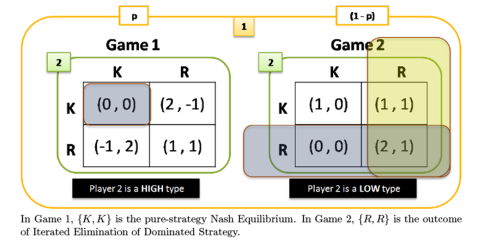
Figure 3: Normal Form
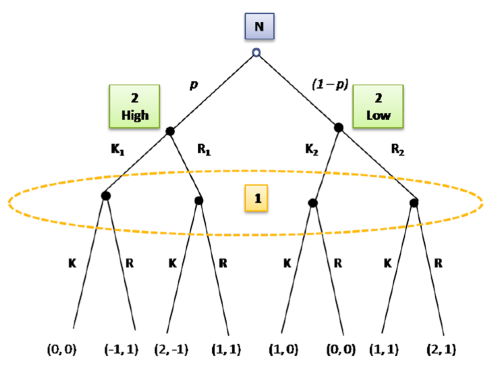
Figure 4: Extensive form
Game 1 is a typical non-cooperative game. is a mutually non-cooperative outcome, where both players pay fines.
is the Pareto-efficient outcome where both students play a cooperative strategy, with no fines incurred.
Student 1 defects (keeping the book), while Student 2 returns it, so Student 2 will get an inferior payoff as Student 1 can keep the book all the way till the deadline.
Game 2 Student 2 is a low type in this game, s.t. , a case in which strategy
is a strictly dominated by
. Student 1 has a higher payoff in choosing strategy
too, as Student 2 returns the book (being a low type), Student 1 will have the book back immediately. So strategy
is strictly dominated by strategy
. Since we assume rationality of both players, the outcome of Iterated Elimination of Dominated Strategy must be a Nash Equilibrium (Gibbons, 1992, pp.13-4).
The expected payoff of type of Student
, when he chooses an action
is
e.g. The expected payoff of Student 1 from choosing strategy , when the high type of Student 2 plays
, and the low type of Student 2 plays
is
Table 2 shows the calculation of the expected payoffs of the game, and Table 3 summarises them:
| (K1, K2) | (K1, R2) | (R1, K2) | (R1, R2) | |
| K | (1 - p), 0 | (1 - p), (1 - p) | 2p + (1 - p), -p | 2p + (1 - p), -p + (1 - p) |
| R | -p, 2p | (-p) + 2(1 - p), 2p + (1 - p) | p, p | p + 2(1 - p), p + (1 - p) |
Table 2: Expected payoffs
| (K1, K2) | (K1, R2) | (R1, K2) | (R1, R2) | |
| K | (1 - p), 0 | (1 - p), (1 - p) | (1 + p), -p | (1 + p), (1 - 2p) |
| R | -p, 2p | (2 - 3p), (1 + p) | p, p | (2 - p), 1 |
Table 3: Simplification of table 2
Trusting and distrust behaviours
Suppose Student 1 has a low level of trust (Table 4)
Claim {K; K1, R2} is the unique Bayesian Nash Equilibrium. Student 1 will choose strategy Keep.
| (K1, K2) | (K1, R2) | (R1, K2) |
(R1, R2) |
|
| K | 0.1, 0 | 0.1, 0.1 | 1.9, -0.9 | 1.9, -0.8 |
| R | -0.9, 1.8 | -0.7, 1.9 | 0.9, 0.9 | 1.1, 1 |
Table 4: Distrust
Suppose Student 1 has a high level of trust (Table 5)
Claim {R; K1, R2} is the unique Bayesian Nash Equilibrium. Student 1 will choose strategy Return.
| (K1, K2) | (K1, R2) | (R1, K2) |
(R1, R2) |
|
| K | 0.9, 0 | 0.9, 0.9 | 1.1, -0.1 | 1.1, 0.8 |
| R | -0.1, 0.2 | 1.7, 1.1 | 0.1, 0.1 | 1.9, 1 |
Table 5: Trusting
Theoretical predictions
If Student 1 distrusts, he would play {Keep} leading to higher accumulative library fines being incurred to him in the long run, ceteris paribus.
If Student 1 is trusting, he would play {Return}, believing that the rest of the readership base would do the same in reciprocity, leading to lower accumulative library fines being incurred to him.
Obviously an alternative option is that Student 1 has finished with the book and returned it on time, with no fines being incurred to him. In this case, Student 1 is a Low type, and he will choose the strategy "non-participation". The game will not be initiated as Student 1 cannot be exploited by Student 2 anyhow, so he is not exposed to the vulnerability described in the section " Rationale". Also note that there are no mixed equilibria in the game, as they will be functions of p, which cannot be interpreted.
Arguments for a simultaneous game instead of a sequential game
Similar to buying from sellers on eBay, the sequential exchange process of library books in our game does not differ fundamentally from simultaneous transactions, since neither party is exposed to the possibility that the other party might not "hold up his end of the bargain". Suppose we can interview both students and they will answer our questions honestly. We can assume that a student's type accounts for all relevant private information that he has about the game, therefore we can define an action for a student in this game to be any plan that specifies a move for the player in every possible future contingency, given his current type. So this process can be thought to be played simultaneously and that both students simultaneously choose actions at the same time frame and they make no further decisions.
EMPIRICAL ANALYSIS
Methodology
Survey Design
The primary aim of the empirical work is to test whether elements of social capital, such as inter-personal trust, would have an effect on library fines. The theoretical prediction of which would be an individual with a higher level of trust should have fewer fines (see section Theoretical Predictions). Therefore, the survey was designed to measure the level of trust, and capture the demographic details of full-time Warwick students.
Much of the existing empirical literature on the measurement of trust relies on attitudinal survey questions from the General Social Survey (GSS). The survey has been running in the U.S. since 1972 and the "trust questions" have been asked almost continuously to allow longitudinal comparison. The same questions have also been included in the World Values Survey (WVS), which is a collaborative effort among research organisations. In my survey, I have taken three questions that are most commonly used to capture trust, GSS Trust, GSS Fair, and GSS Help. The answer range of the "trust questions" were replicated from Glaeser et al. (2000) so that they were akin to a similar survey conducted at Harvard University. See Appendix C for a detailed explanation of the variables.
The empirical evidence of the effectiveness to predict trust using an unpaid survey is mixed. For example, Avner and Freyr's (2007) results confirm that the amount sent in the "trust game" (i.e. experimental evidence of trust), is related to survey measures of trust; while Glaeser et al. (1999); Glaeser et al. (2000) found that the attitudinal questions capture trustworthiness instead of trust. However, in our case, the survey respondents had no incentives to hide their genuine trust level, as the survey was anonymous and the relationship between library fines and trust had not been made clear to them.
Other attitudinal questions from psychology literature, such as Rosenberg (1980); Rotter (1967); Rotter (1971), were tedious to include, and most of the time they did not significantly predict trust (Glaeser et al., 2000), as such they were not included in my survey. However, several questions about a respondent's "care-free" behaviour in the past were included to capture the level of insouciance.
A pilot study was carried out and 10 participants were invited for a discussion to foresee any potential problems of the survey. Some complained about the lack of available choices. As a result, an option "depends" was added in Questions 17, 18, and 19 (see Appendix D).
Sample Size
I followed Krejcie and Morgan (1970)'s equation to determine a representative sample size of my survey.
where is the chi square value for 1 degree of freedom;
is the population size;
is the confidence interval chosen;
is the population parameter of a variable.
Substituting and
[6] into (4.1), we can determine the size of our sample required for the population at 5% confidence level should be at least:
Full-time undergraduates, taught and research postgraduates from 48 departments and research centres at Warwick were invited to complete an online questionnaire. The response was overwhelming – over 1300 students have responded.[7]
Econometrics Techniques
Normal OLS estimation using censored data will lead to biased estimation of the OLS estimator, hence inconsistent estimates of the marginal effects (Verbeek 2008). Since the regressand accfines is non-negative, the specification error in our case is what econometricians call "censoring resulting from a corner solution" (Wooldridge, 2002: 518). To overcome this problem, I have used a maximum likelihood estimation method for the tobit model, which defines the observable non-negative dependent variable to be equal to the latent variable
whenever the latent variable has a zero or positive value (Tobin, 1958).[8] This treatment has been widely used in the literature.
Results
The following principle equation, and modifications to this equation have been estimated.
In Table 8, Regressions (1)-(2) examine whether different demographics have an effect on accumulative library fines. The second regression investigates the issue of gender disparity in particular. The third and fourth regressions examine the relationship between trust and library fines. The last regression links a student's past carefree behaviour with library fines. The last column of Appendix D gives a summary of the responses from the survey. Appendix C provides a summary of the data.
Average Library Fines
In Table 6, among other Russel Group universities, an average Warwick student incurred £6.70 in fines in the 07-08 academic year. This could either mean that Warwick students are not notoriously bad in terms of late returns, or the penalty is not as high as in other universities. The average fines incurred captured in my survey matched closely with the actual figure, which elicited truthful subject reporting.
| Actual (07-08) | This survey | |
| London School of Economics | £ 10.61 | |
| University College London | £ 9 | |
| University of York | £ 7.63 | |
| University of Warwick | £ 6.70 | £ 5.18 |
| University of Bristol | £ 5.86 | |
| University of Cambridge | £ 1.90 | |
| Imperial College London | £ 0.50 |
Table 6: Average annual library fines of a student 2007-2008 (Source: University of Warwick Library via Freedom of Information Act (2000) and Stevens (2008). (Reproduced by kind permission of Exeposé)
Short Loan
An average student who admitted to having incurred fines from the Short Loan Collection has significantly (£13.57) more fines than those who did not admit to having received fines form the SLC, ceteris paribus.[9]
Disposable Income
This is a proxy of how well-off a student is. An increase of £10 in weekly disposable income would lead to 30p more fines on average. One would expect that an individual's sensitivity to money is decreasing with wealth.
Summer Term
My result shows that fewer fines were incurred in term 3. One possible explanation is that as the demand of books was at a premium before the exam, more and more students put holds on library books, which indirectly increased the level of punishment (from 20p/day for a book not on hold, to 80p/day if the book is on hold). As foreseen by Becker (1968), a higher level of punishment would lead to fewer crimes.
Living Off-campus
A large number of respondents used living far away from campus as an excuse for late return of books. While the sign of the variable is correct, living off-campus had an insignificant effect on fines.[10] I presume it is all down to time management and self-discipline, as we can see that not all students living off-campus have library fines.
Academic Attainment
Goddard (2003) predicted that a low level of trust is associated with low academic attainment, which implied individuals with high academic attainment should have a higher level of trust, thereby less library fines. However, this effect is not statistically distinguishable from zero.
Final Year
As expected, final-year students are generally more concerned about their studies and consequently willing to pay a higher cost to keep a library book. They have incurred on average £3.63 more fines than pre-ultimate year students.
Gender Disparity
In the second regression, I found that an average female student, relative to male, would incur £2.30 more library fines over an academic year. This result confirms the consistent evidence of gender differences in risk preference. For instance, males and females adopt different strategies in making financial decisions. Jianakoplos and Bernasek (1998) found that single women exhibit relatively more risk aversion. Povey (1999) conceptualised risk aversion and its relations to trust. He claimed that risk is exposed by the trusting behaviour and influences the trusting intentions and possibly the situational decisions to trust. Experimentally, Avner and Freyr (2007) confirmed that female subjects had less trust, sending significantly less than males in Berg et al.'s (1995) trust game. Therefore, coherent with my findings, there are reasons to believe that greater risk aversion can lead to strategies engendering distrusting decisions that result in relatively more library fines, which may be true in a student community where most females are young and single.
Levels of Trust
Table 7 illustrates mean answers to GSS Trust. Evidence suggested that there were substantial variation of responses by birth-year, race, and education. In particular, people who are more educated tend to have higher levels of trust. Glaeser et al. (2000) suggested this may be the case because education might create individual social capital by raising social skills or the ability to reward and punish others. Table 7 compares the trust level with those who participated in my survey: 44.4% of Harvard undergraduates, and 42.6% of U.S.-college-educated GSS respondents reported that "most people can be trusted", close to the rate of 40% in my Warwick sample.[11]
Q17. "Generally speaking, would you say that most people can be trusted or that you can't be too careful in dealing with people?"
|
Percent responding that... "...most people can be trusted" |
|
| US (1911-1915 birthyear) | 42.3% |
| US (1961-1965 birthyear) | 30.1% |
| US (White) | 44.2% |
| US (Black) | 16.1% |
| US (other races) | 26.6% |
| US (college diploma and birthyear after 1965) | 42.6% |
| US (no high school diploma) | 26.3% |
| Harvard Undergraduates (1997) | 44.4% |
| Warwick Students (2009) | 40.0% |
Table 7: Average Levels of Trust. Source: The National Opinion Research Center's General Social Survey. Reproduced with kind permission of Professor David Laibson, Department of Economics, Harvard University. Warwick data are from author's survey.
GSS Trust
In the third regression, I examine the hypothesis of whether trust has an effect on library fines. Individuals who believed that "most people can be trusted" have £3.26 less fines than those who believe "that you can't be too careful in dealing with people." This effect is statistically significant at 10%.
Trust Index
Regression 4 presents my benchmark results. I replaced GSS Trust with an index of trust. Following Glaeser et al.'s (2000) methodology, the Trust Index was formed by adding GSS trust to two additional attitudinal variables that measure one's confidence in other people (GSS fair, and GSS Help), after they are de-meaned, normalised by their standard deviations, and re-signed so that they were conceptually aligned. An increase in this index denotes a higher level of trust.
Mathematically, let a set
An increase in the level of trust by one standard deviation would lead to a £2.54 decrement in accumulative library fines incurred by an average student over an academic year. It is statistically significant at 1%. This confirms my hypothesis that the contractual element of inter-personal trust indeed has an effect on the actual behaviour of library users.
Carefree Index
The next regression examines the connection between my index of past carefree behaviour and library fines. Similar to the trust index, this index was formed by three variables aiming to measure the level of insouciance of a student.
Mathematically, let a set
An increase in this index denotes a higher level of insouciance. As expected, one standard deviation increase in this index significantly leads to £1.75 more fines being incurred. This implies that careless students have more library fines.
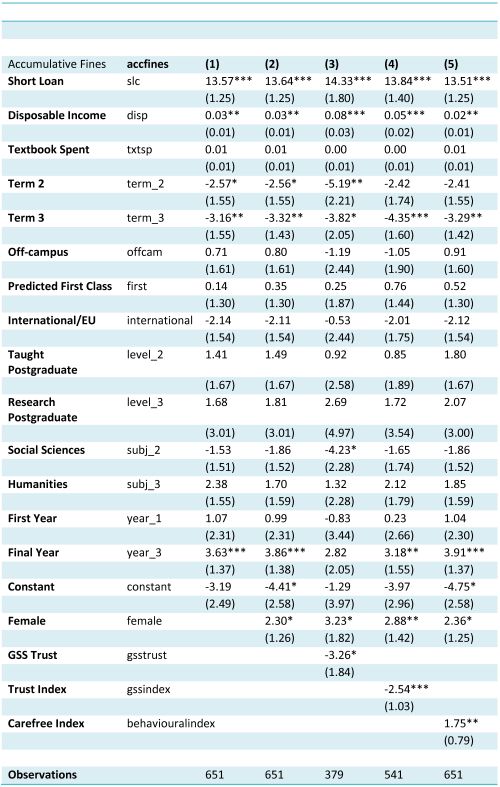
Table 8: Main Regression Results
Notes: The standard errors are given in parentheses.
***, **, * denotes significance at the 1 percent, 5 percent and 10 percent level, respectively.
Implications on Policy Making
The evidence presented above showing the importance of trust presages some implications for future policy making and research. Below I provide an example of real life policy implications at a micro- and a macro-level. I will examine a possible policy mechanism to prevent library users from being selfish by introducing an incentive structure to ensure a high-trust environment. We can see how trust can incite significant positive externalities where positive spillovers can lead to an outcome where everyone is better off.
Suggestions for a better library fines system
There are reasons to believe that "inter-personal trust" has a bearing on what strategies that library users choose. Under the current fines system, there are mechanisms in place to ensure students to return on time. However, it is not very effective in engendering "trust" in the community. See Appendix A for an exposition of how students exploit the loopholes in the fines system. Figure 5 shows that regardless of how many times a student fails to bring a library book back, he still pays the same amount in fines.[12] There is no difference if it is the first time that a student forgets to bring the book back on time, or the 100th time. This is the origin of the problem. The marginal cost for a student to commit a crime is constant.
The suggested system would provide incentives for people not to violate the system so frequently, by ensuring a high level of inter-personal trust among library users. Figure 6 outlines the suggested system. The severity of punishment increases with the number of times that a reader exploits the system, making the marginal cost of committing a crime incremental. In most cases, it is due to genuine forgetfulness that students forget to bring their books back on time, so that the level of punishment is very low for the first few times that this happens. Yet, if someone chooses to exploit the system repeatedly, he will have to pay for a higher marginal cost in doing so. My suggested system essentially makes the expected value of punishment higher, relative to the old system (See Figure 8). By doing so, library users can foresee the consequences of their actions, yet at the same time being very lenient to users who are genuinely forgetful for the first few times. Given the correct incentives, I believe that everyone using the library will start to behave in a "trusting" manner, observable by constant compliance to return books on time.
To increase the level of punishment, it is not always necessary to increase the level of fines. For books which are constantly highly demanded, such as those in the Short Loan Collection, a more stringent system can be put in place. We can shorten the grace period by imposing a higher level of fines earlier, for example, on the third time that a student fails to bring the book back on time (See Figure 7).
Last but not least, a student's past carefree behaviour has been shown to have an adverse effect on his fines record (See Carefree Index above). Further education of library users to ensure that they are aware of the different tools that are available for them to renew their books on time can also help shape a high-trust library community.
Figure 5: Current fines system [Click on image for larger version]
Figure 6: Suggested fines system for normal loans [Click on image for larger version]
Figure 7: Suggested fines system for short loans [Click on image for larger version]
Figure 8: Expected values of punishment [Click on image for larger version]
Conclusion
The main insight of this paper is that "trust" can provide a valid basis of explanation for many different observed social phenomena, and this explanation, in turn, can be applied to the design of many public policies to yield a collective outcome that may improve the welfare of the society.
A bottom-to-top approach was used in this paper to analyse a trivial social problem of library fines. By modelling the behaviour of library users, I effectively show that trust has a bearing on the decisions made by individuals. Using a survey of 1300 students, the level of trust and the level of insouciance among other demographic variables were empirically tested. The observational findings seem to fit very well into my initial theoretical predictions. It is shown that policies involving exchange of public goods, where cooperation between different agents is needed would involve trust.
This paper has expatiated some possible policy implications in the real world. Yet, the discovery of the importance of numerous socio-economical endowments, such as trust, by experimental economists has often been overlooked. Regrettably, policy-makers today have yet to recognise and fully subsidise the innovative ideas generated in the field of experimental economics. Hopefully those ideas can be incorporated into the design of future policies, from library fines setting, to global environmental strategies on limiting emissions, so as to induce greater positive externalities to the society.
Acknowledgements
I would like to thank my supervisor Dr. Maria Ruiz-Martos, for her generous help, enthusiastic advocacy and stoic patience, without whom this project would not have been possible. I am also grateful to Syed, Gilligan, Yiannis, Kavit, Helen, Prof. Jeremy Smith, the staff at the University of Warwick Library and the respondents of my survey.
List of Illustrations
Figure 1: Extensive form of the "trust game" with t > r > s > 0
Figure 2: Timeline of the game
Figure 3: Normal form
Figure 4: Extensive form
Figure 5: Current fines system
Figure 6: Suggested fines system for normal loans (more lenient)
Figure 7: Suggested fines system for normal loans (more stringent)
Figure 8: Expected values of punishment
Figure 9: Questionnaire
List of Tables
Table 1: Revenue from library fines and number of full-time students at Warwick (trended). Source: Academic Office and University of Warwick Library via Freedom of Information Act (2000)
Table 2: Expected payoffs
Table 3: Simplification of Table 2
Table 4: Distrust (P = 0.9)
Table 5: Trusting (P = 0.1)
Table 6: Average annual library fines of a student 2007-2008. Source: University of Warwick Library via Freedom of Information Act (2000) and Stevens (2008). Reproduced by kind permission of Exeposé.
Table 7: Average levels of trust. Source: The National Opinion Research Center's General Social Survey. Harvard and US data from Glaeser, Laibson, Scheinkman and Soutter (2000). Reproduced by kind permission of Professor David Laibson, Department of Economics, Harvard University. Warwick data from author's own survey.
Table 8: Main regression results
Table 9: Summary statistics
Table 10: Explanation of variables
Appendix A
Tricks of the Trade: Exploiting the Loopholes
What happens if you have taken a book out, which you don't really want to surrender until your deadline is over, and someone else requested it online demanding its prompt return?
Many Warwick students have been exploiting the loopholes of the book reservation system, either knowingly or unknowingly. Below provides a brief account.
Assuming a student really needed the book for an exam or an assessed essay, the most commonly used strategy among Warwick students is that: you simply shirk.
A few Warwick students described:
Usually, people just take them out as soon as possible, and keep them regardless of the fines, as they know they won't be able to [write] their essay/presentation/exam otherwise. (Entry #747)
Library fines I have incurred are ones that I am aware of because I either a) require a text immediately and have no other option; b) know that whoever takes the text would do exactly the same thing and hold onto it for inordinate periods; or c) simply to be vindictive. (Entry #745)
When a library book is recalled by another user, a "bib-level hold"[13] will place a hold on the first available copy of the requested title.[14] As long as someone brings his copy back before you, the hold request will be satisfied. Therefore it may be advantageous to pay for a few days' worth of fines to keep your book, until someone else brings the same title back before you. In many cases, one can get away by not returning the book intentionally for a few days – renew the book online once after the hold is satisfied by another user.
As one of the victims observed:
Other students requested the books I needed and those people whose books' return dates were before mine never returned the books. (Entry #105)
In another one of the system's most commonly exploited loopholes, students will reserve a book and have their friends reserve the same book for consecutive reservation slots, even if they will not be using it themselves.
Appendix B
Summary Statistics
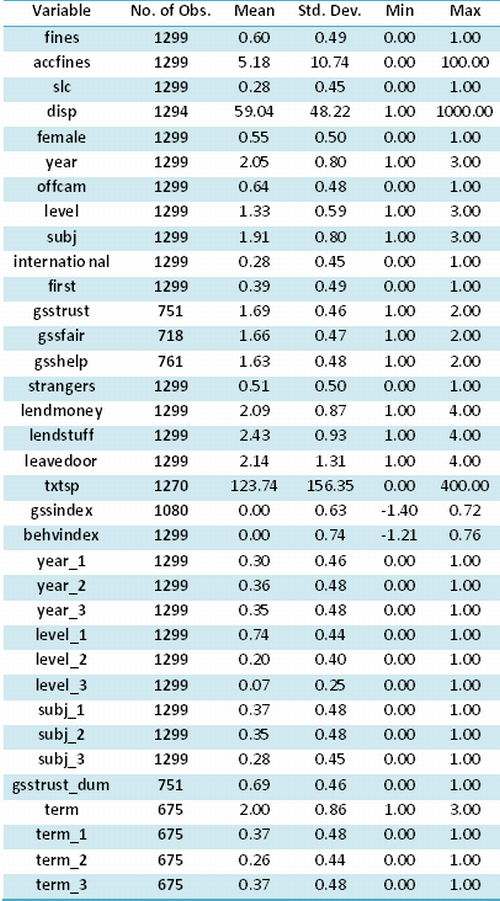
Table 9: Summary Statistics
Appendix C
Explanation of Variables
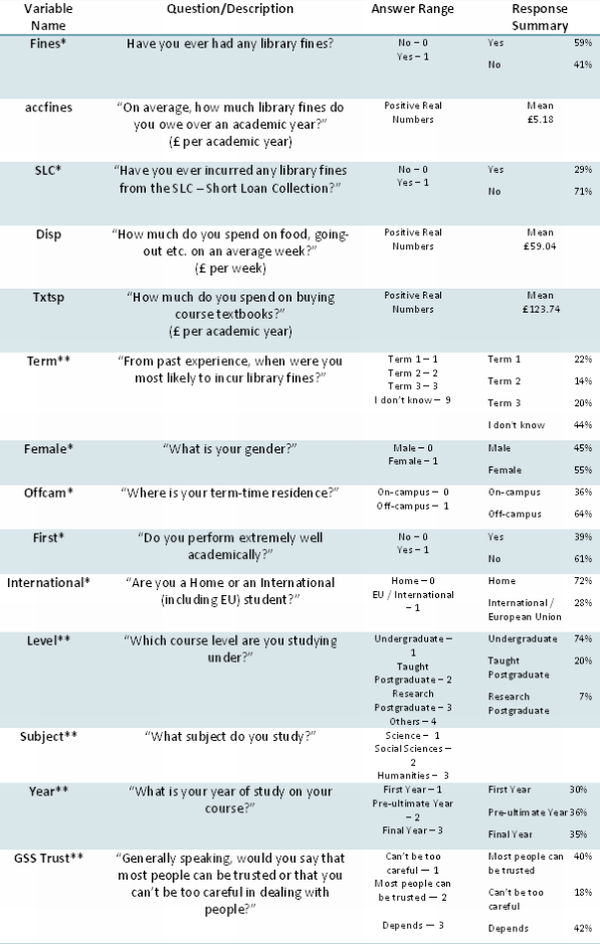
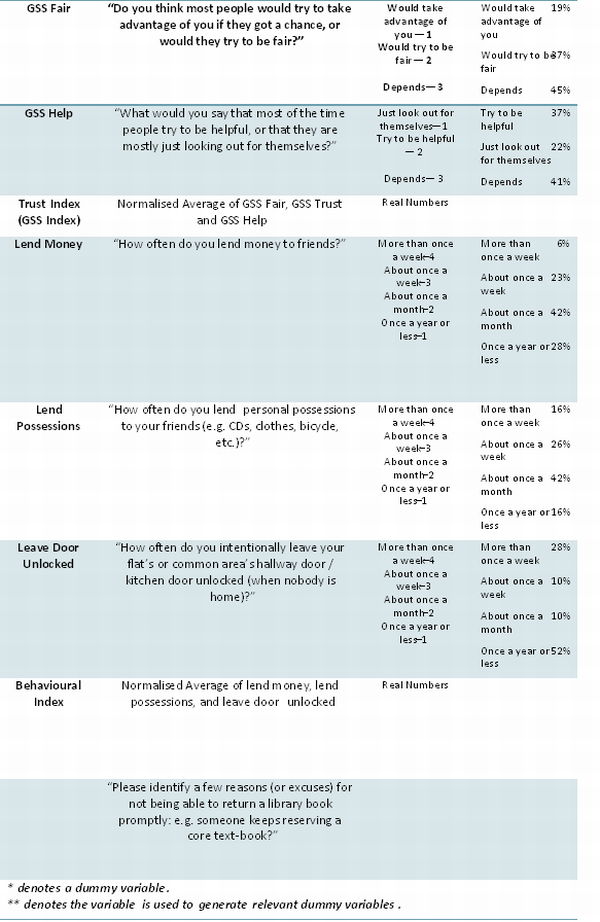
Table 10: Explanation of Variables
Appendix D
Questionnaire
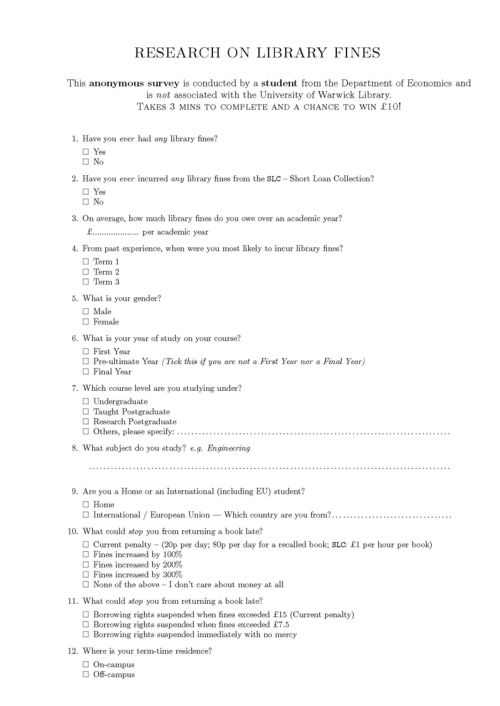
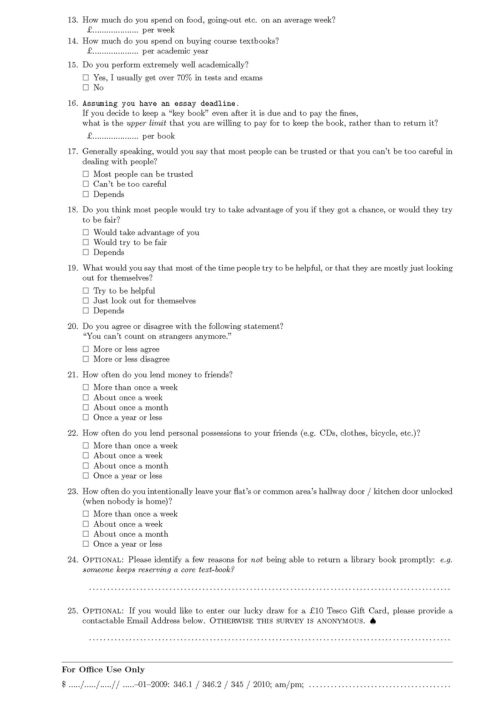
Figure 9: Questionnaire
Notes
[1] Michael Yeung studied Economics at the University of Warwick and currently works as an Actuarial Analyst at a life insurance company in Birmingham.
[2] In the 33rd year of the reign of King Henry II.
[3] i.e. having purely self-regarding preferences.
[4] In my paper I assume students use information that is available to them during everyday life at university to construct trust-like expectations. My underlying assumption is that individuals are rational enough to behave trustworthily to various degrees, forcing them to at least contemplate trusting behaviour in making decisions.
My survey below may seem to have captured " trustworthiness", rather than "trust" as I claimed. My point of view is that if one is "trustworthy" (having high "trustworthiness") on average they tend to trust others as well. That means I see " trust" as, at least in part, depending on "expected trustworthiness" . This is an opinion backed by many other researchers.
For example, Bradley Ruffle and others have done trust experiments among different types of Jews in Israel. Justine Burns has done trust experiments with school children in South Africa; Diego Gambetta and others have embedded trust experiments in surveys of British citizens. All of these researchers see trust as, at least in part, depending on expected trustworthiness.
Notably, Barr (2003)'s experimental results essentially suggest that trusting behaviour is based on expectations about people's trustworthiness, in which she stipulated that: "trusting behaviour can be motivated by expected trustworthiness is uncontroversial" (p. 614).
[5] A high-type student will always choose to keep the book. See equation 3.5.
[6] Number of students who have borrowed library books 2007—08. Source: University of Warwick Library
[7] Response rate approx 30%.
[8] Since the tobit model has a probit component, its results are sensitive to the assumption of homoskedasticity. In our case, the robust standard errors of all the regressions are broadly very similar with the exception of the variable disposable income, where the p-value fell from 0.02 to 0.18.
[9] ceteris paribus is assumed when interpreting marginal effects hereafter.
[10] There is an obvious limitation to this variable – the actual distance of how far away a person lives from campus was not measured.
[11] Such surveys have not been conducted in any other U.K. universities, as such comparisons within the U.K. could not be made.
[12] 20p per day for a normal item; 80p for for a recalled (demanded) item.
[13] Also known as "Hold Copy Returned Soonest". This function will ensure that the patron receives the next returned copy or that the patron is placed in the holds queue on a first come, first served basis. Source: Millennium Circulation: Basic Functions Tutorial
[14] Normally there are multiple loanable copies of the title required.
References
Abbink, K., B. Irlenbusch and E. Renner (2000), 'The moonlighting game: An experimental study on reciprocity and retribution', Journal of Economic Behavior and Organization, 42 (2), 265–77
Ajay, N. A. and A. A. Okunlola (2005), 'Students' perception of fine increases for overdue library books in an academic library', Journal of Librarianship and Information Science, 37 (4), 187–93
Arrow, K. J. (1972), 'Gifts and Exchanges', Philosophy and Public Affairs, 1 (4), 343–62
Avner, B.-N. and H. Freyr (2007), 'Measuring Trust: Which Measure Can Be Trusted?', Technical report, Industrial Relations Center, University of Minnesota, Working Papers 0207, Industrial Relations Center, University of Minnesota (Twin Cities Campus)
Barnard, A. and J. C. McGinty (2007), 'Late Library Books Can Take a Toll on Credit Scores', The New York Times, 26 December 2007, http://www.nytimes.com/2007/12/26/nyregion/26library.html, accessed 30 September 2008
Barr, A. (2003), 'Trust and expected trustworthiness: experimental evidence from Zimbabwean villages', The Economic Journal, 113 (489), 614–30
Becker, G. (1968), 'Crime and Punishment: An Economic Approach', The Journal of Political Economy, 76 (2), 169–217
Berg, J., J. Dickhaut and K. McCabe (1995), 'Trust, Reciprocity, and Social History', Games and Economic Behavior, 10 (1), 122–42
Bromiley, P. and L. Cummings (1995), 'Transactions Costs in Organizations with Trust', Research on Negotiation in Organizations, 5, 219–50
Burgin, R. and P. Hansel (1984), Library overdues: analysis, strategies, and solutions to the problem, Haworth Press, New York
Charness, G. (2004), 'Attribution and Reciprocity in an Experimental Labor Market', Journal of Labor Economics, 22 (3), 665–88
Charness, G. and U. P. Fabra (1997), Attribution and Reciprocity in a Simulated Labor Market: An Experimental Investigation, Universitat Pompeu Fabra.
Clark, K. and M. Sefton (2001), 'The Sequential Prisoner's Dilemma: Evidence on Reciprocation', The Economic Journal,111 (468), 51–68
Cruise, W. (1794), An essay on the nature and operation of fines and recoveries, Vol. two, A. Strahan and W. Woodfall; for J. Butterworth, London
Dasgupta, P. (2000), Economic Progress and the Idea of Social Capital, World Bank
Fukuyama, F. (1996), Trust the social virtues and the creation of prosperity, Free Press Paperbacks
Gachter, S. and A. Falk (2002), 'Reputation and Reciprocity: Consequences for the Labour Relation', Scandinavian Journal of Economics, 104 (1), 1–26
Gibbons, R. (1992), A primer in game theory, Harvester Wheatsheaf London
Glaeser, E. L., D. Laibson, J. A. Scheinkman and C. L. Soutter (1999), 'What is Social Capital? The Determinants of Trust and Trustworthiness', National Bureau of Economic Research Working Paper Series No. 7216
Glaeser, E. L., D. Laibson, J. A. Scheinkman and C. L. Soutter (2000), 'Measuring Trust', Quarterly Journal of Economics, 115 (3), 811–46
Goddard, R. (2003), 'Relational Networks, Social Trust, and Norms: A Social Capital Perspective on Students' Chances of Academic Success', Educational Evaluation and Policy Analysis, 25 (1), 59–74
Güth, W., W. Klose, M. Kцnigstein and J. Schwalbach (1998), 'An Experimental Study of a Dynamic Principal–Agent Relationship', Managerial and Decision Economics, 19, 327–41
Güth, W., P. Ockenfels and M. Wendel (1994), 'Efficiency by trust in fairness – an experimental study', Journal of Mathematical Psychology, 42 (1), 227–47
Henrich, J., R. Boyd, S. Bowles, C. Camerer, E. Fehr and H. Gintis (2004), Foundations of Human Sociality: Economic Experiments and Ethnographic Evidence from Fifteen Small-Scale Societies, Oxford University Press, USA
Jacobsen, E. and A. Sadrieh (1996), 'Experimental Proof for the Motivational Importance of Reciprocity. SFB 303', Technical report, Universitat Bonn, Discussion Paper No. B-386
Jianakoplos, N. and A. Bernasek (1998), 'Are Women More Risk Averse?', Economic Inquiry, 36 (4), 620–30
Knack, S. and P. Keefer (1997), 'Does Social Capital Have An Economic Payoff? A Cross-Country Investigation', Quarterly Journal of Economics, 112 (4), 1251-88
Krejcie, R. V. and D. W. Morgan (1970), 'Determining Sample Size for Research Activities', Educational and Psychological Measurement, 30, 607–10
La Porta, R., F. Lopez-de-Silane, A. Shleifer and R. Vishny (1997), 'Trust in Large Organizations', American Economic Review Papers and Proceedings, LXXXVII, 333–38
Macaulay, S. (1963), 'Non-Contractual Relations in Business: A Preliminary Study', American Sociological Review, 28 (1), 55–67
Martin, M. and B. Park (1998), Charging and collecting fees and fines, Neal-Schuman, New York
Nooteboom, B. and F. Six (2003), The Trust Process in Organizations: Empirical Studies of the Determinants and the Process of Trust Development, Edward Elgar Publishing
Polinsky, A. M. and S. Steven (1993), 'Enforcement Costs and the Optimal Magnitude and Probability of Fines', Technical report, NBER, National Bureau of Economic Research, Inc
Povey, D. (1999), 'Developing Electronic Trust Policies Using a Risk Management Model', Proceedings of the International Exhibition and Congress on Secure Networking-CQRE (Secure)'99', Springer-Verlag London, UK, 1–16
Putnam, R. D. (1993), Making democracy work: civic traditions in modern Italy, Princeton University Press, Princeton, N.J.
Rosenberg, M. (1980), Occupations and values, Ayer Publishing
Rotter, J. (1971), 'Generalized expectancies for interpersonal trust', American psychologist, 26 (5), 443–52
Rotter, J. (1967), 'A new scale for the measurement of interpersonal trust 1', Journal of personality, 35 (4), 651–65
Rousseau, D. M., S. B. Sitkin, R. S. Burt and C. Camerer (1998), 'Introduction to Special Topic Forum: Not so Different after All: A Cross-Discipline View of Trust', The Academy of Management Review, 23 (3), 393–404
Rousseau, S. and R. Rousseau (1999), 'Optimal fines in libraries and documentation centers', Seventh Conference Of The International Society For Scientometrics And Informetrics, Technical report, Seventh Conference Of The International Society For Scientometrics And Informetrics, Universidad de Colima, 431–40
Schelling, T. (1989), 'Promises', Negotiation Journal, 5 (2), 113–18
Stevens, J. (2008), 'Library fines expected to soar', Exeposé, 7 May 2008, Exeter, https://xmedia.ex.ac.uk/news/2008/05/07/library-fines-expected-to-soar, accessed 16 October 2008
Tobin, J. (1958), 'Estimation of relationships for limited dependent variables', Econometrica: Journal of the Econometric Society, 26, 24–36
Verbeek, M. (2008), A Guide to Modern Econometrics, John Wiley and Sons, Chichester
Wooldridge, J. (2002), Econometric analysis of cross section and panel data, MIT press
Zelmer, J. (2003), 'Linear public goods experiments: a meta-analysis', Experimental Economics, 6 (3), 299–310
To cite this paper please use the following details: Yeung, M. (2010), 'Library Fines, Trust Games and Reciprocity', Reinvention: a Journal of Undergraduate Research, Volume 3, Issue 1, http://www.warwick.ac.uk/go/reinventionjournal/archive/volume3issue1/yeung Date accessed [insert date]. If you cite this article or use it in any teaching or other related activities please let us know by e-mailing us at Reinventionjournal@warwick.ac.uk

